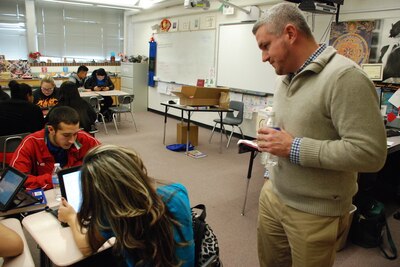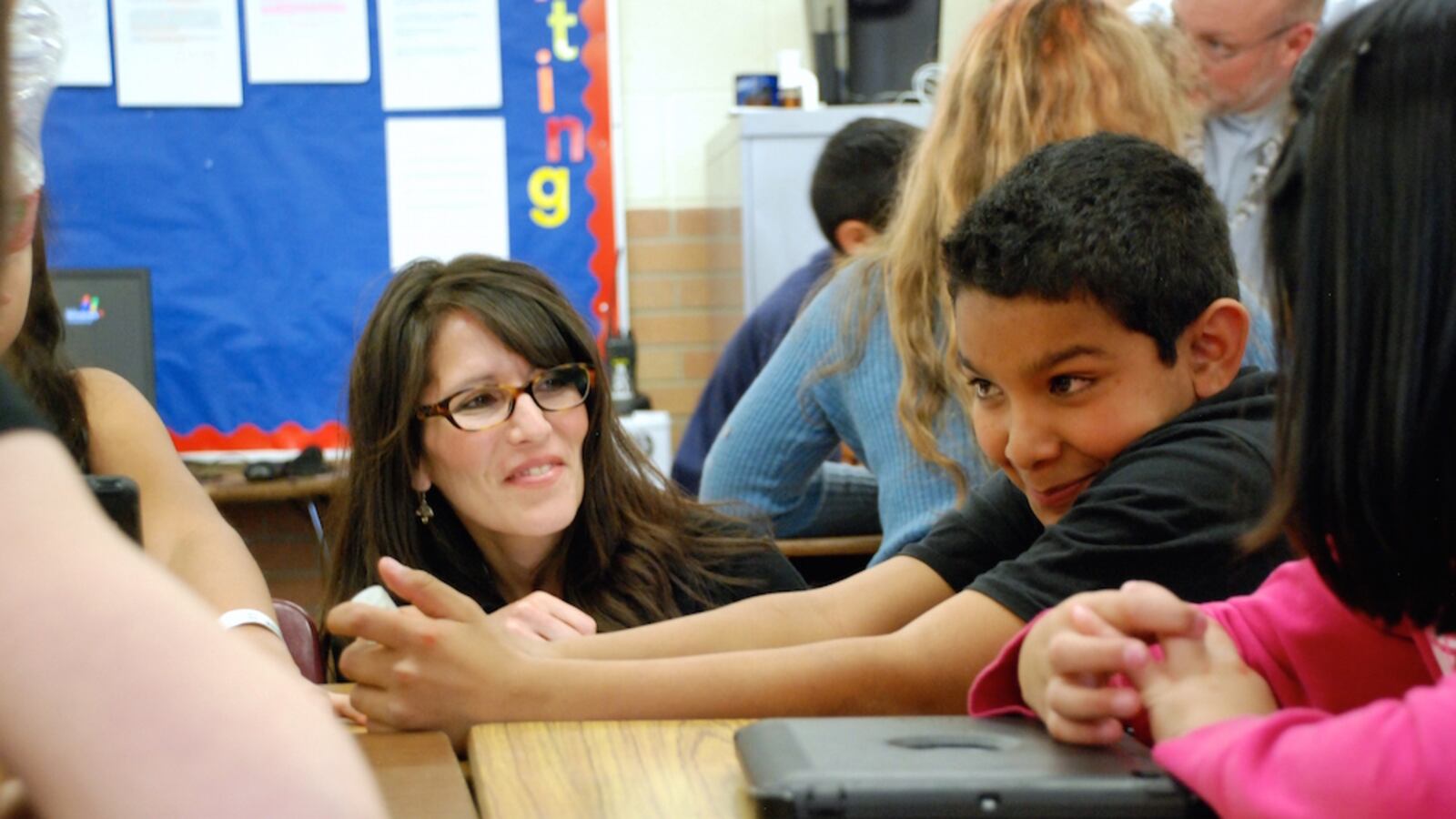EDGEWATER — When Principal Michael James joined the administration team of Jefferson High School, he was appalled at the disrespect in the hallways and the litter around campus. Two years later, the hallways are quiet and the lawn, while dried out from the fall, is freshly manicured.
“It’s not a perfect walk everyday,” James said, referring to his regular rounds through the halls to check on classrooms. “But I don’t feel that culture is here anymore.”
Jefferson High, Jeffco Public Schools’ lowest performing high according to state tests, is in a bit of an upswing. It will be announced next week the school, which serves mostly Latino and poor students, has climbed a rank in the state’s annual evaluation, ending the possibility of state sanctions.
But that progress so far isn’t enough.
That’s why James, other area principals, and district leaders are proposing a substantial overhaul to the educational programs and operations at Jefferson High and the five schools that send students to the secondary school. The proposed changes, if approved, will affect schools that serve the poorest students of Jefferson County.
The proposal, which was shared with teachers earlier this week and the community’s parents today, calls for an extension of the school day and year, and for an expansion of dual language programs. The principals also want students in all grade levels to focus on longer-term projects that require problem solving skills rather than rote memorization and recall.

Further, if the proposal is approved by the Board of Education next year, Jefferson High School will serve seventh through 12th grades while all other schools in the neighborhood will serve pre-kindergartners through sixth grade.
Jeffco officials may also ask the state to grant innovation status to Jefferson High. That would provide charter school-like waivers to some state laws for the school.
Teachers at all schools would also receive similar professional development while students and families would see an increase in support for their social and emotional needs.
“I split a social worker with another elementary school,” said Rhonda Hatch-Rivera, principal of Lumberg Elementary School. “That’s not nearly enough support for my students.”
The proposed changes — which administrators and school leaders stress have not been finalized — would be the most substantial overhaul for the poorer Jefferson High School articulation area since anyone can remember. Teachers and community members will be invited to share their input on the proposal in various meetings throughout January.
While test scores have risen in some areas, all has not been equal. Principals of the Jefferson area, which include the entire city of Edgewater and slices of Lakewood and Wheat Ridge, believe these changes will fix that.
“We’ve known for several years — the Jefferson area has unique needs,” said Terry Elliott, Jeffco’s Chief School Effectiveness Officer. “And when you look at the data, we need to look at it differently and do everything we possibly can to support student growth. While we’ve made some improvements and we have some celebrations. But it’s not widespread enough. It’s not everybody — we do need to improve.”
In many ways the Jefferson area population is more like urban Denver than suburban Jefferson County. The average household income in the city of Edgewater is about $40,000, compared to the county average of $68,000. Residents are also mostly Latino. Additionally, Jefferson-area principals believe white and middle class students in the area are choosing to attend other Jeffco schools because of the reputation Jefferson High School has earned throughout the years.
“Our area is losing a lot of families to choice,” James, the high school principal, said. “Some have preconceived notions about what happens at our school. We need to make these changes so our community in Edgewater can be proud of all of our schools.”

The most substantial changes in the proposal is the closure of Wheat Ridge 5-8, moving seventh and eighth graders in the area to Jefferson High, and the consideration of innovation status for Jefferson High.
Wheat Ridge 5-8 has been considered a failing school by the state education department for four years. While Elliott praised the teachers at the school for their hard work, he acknowledged the rare school model is not working for students. He said if the plan goes through, those students will likely move to Stevens Elementary School and many of the teachers at Wheat Ridge 5-8 will be relocated.
“Those grades don’t go away, so those teachers don’t go away,” he said.
Elliott and school principals hope their suggestion to close Wheat Ridge 5-8 will reduce the number of transitions students have to make, and the one they do easier. Previous transitions between schools, James said, have led to a loss of student proficiency in math and English.
Similar reforms at the middle school level have been rolled out in Cincinnati, which influenced some of thinking in Jeffco, Elliott said.
If Jefferson High seeks innovation status, it would be the first in the district to do so. Innovations schools are an advent of a 2008 state law. Schools granted innovation status are freed from many central administration policies such as budget rules, curriculum mandates, and teacher contracts. Architects of the law believed that granting such freedoms could accelerate academic achievement.
Results in Denver, where innovations schools are most common, have been mixed.
Before the school can seek waivers from the state, 60 percent of teachers at Jefferson High, a majority of the school’s administration and School Accountability Committee, as well as the Jeffco school board must sign off on an application.
Given the political division between the school board and teachers union, that might be easier said than done.
President of the Jeffco teachers union John Ford said he thought teachers should have been involved in drafting the proposal, instead of just asking for feedback.
Ford said the proposal may in fact be the best thing for the Jefferson neighborhood, “but you have to have some conversations with people who work in those buildings, more than just the principals. This is just another example of unilateral decision making without teacher input.”
Ford said he’s heard from dozens of teachers from the area, most concerned about the lack of collaboration.
Elliott, the district effectiveness officer, said the rollout to teachers was intentional. He said he hoped teachers would have time to reflect on the proposal during the winter break and share feedback in January when they return.
“It was never an intent to exclude teachers,” Elliott said. “It’s just a question of where do you start a process?”
Jefferson High Principal James hopes politics doesn’t get in the way of accelerating student achievement.
“I need to know in my heart of hearts that [the school board] understands that a school like Jefferson is different than Dakota Ridge, or Conifer, or almost any of the district’s high schools — and there are 17 of them,” he said. “I want them to know and trust that there are structures and programs and the right people in place to make a difference in these schools.”
Correction: This article has been updated to reflect there are 17 other comprehensive high schools in Jeffco, not 12. It has also been corrected to correctly identify Stevens Elementary School.

